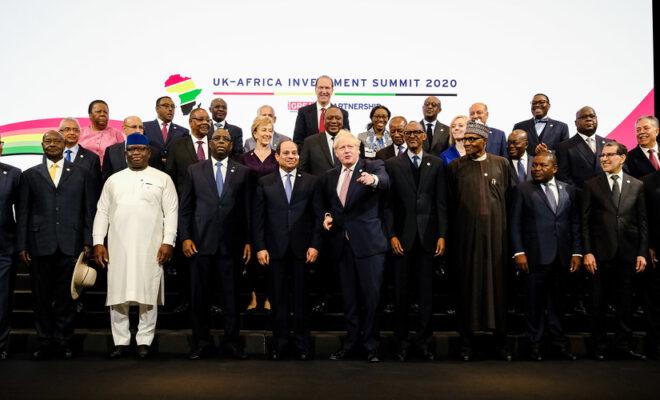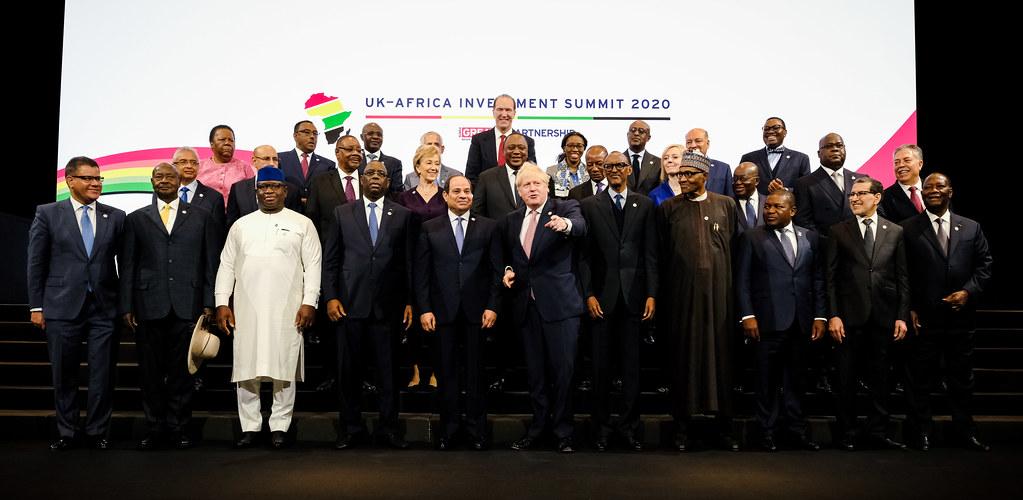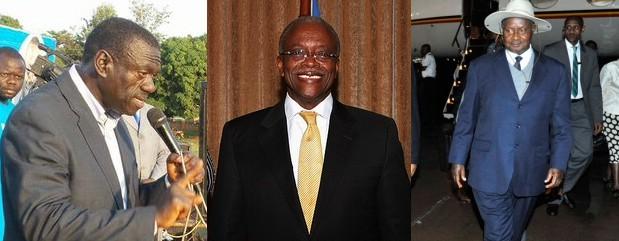UK-Africa: Private sector investment can be good, but not usually this type

Investment can help reduce poverty, promote women’s empowerment, and support children’s rights. It can also do the opposite.

A photo of the leaders at the UK-Africa Investment Summit. Credit: DFID/Jim Winslet
Just ten days before Brexit is declared, the UK is hosting a major investment summit attended by Prime Minister Boris Johnson and an array of royals. There is much hype about the event with hopeful win-win-win rhetoric abounding linked to forging new partnerships for a post-Brexit future. Ghana, it seems, is being given top treatment as a favoured destination, while Zimbabwe appears to have been snubbed despite being “open for business“.
UK aid policy these days is focused on promoting UK trade interests abroad. Whether its Department for International Development (DfID) survives as a separate entity or gets incorporated into the Foreign and Commonwealth Office will soon be known. But whatever happens, the government has adopted a global business promotion approach for UK firms.
I have no objection to private sector investment and trade, but whether all such initiatives meet the criteria we assumed were central to UK aid policy is another matter. Questions have been raised about the allocation of funds to dubious outfits. The linking of aid and trade of course has a history in Britain. It was the 1994 Pergau dam scandal – in which aid was used as a sweetener for an arms deal – that led to the commitment to untie aid as well as the establishment of separate development department and an Act of Parliament specifying how aid must be spent. This consensus on aid since the mid-1990s, however, is now under threat.
Trade and investment can of course help reduce poverty, promote women’s empowerment and be good for children’s rights. But the opposite may be true too. There are many different business models – and so labour, environmental and rights regimes – with very different outcomes. We’ve been looking at some of these issues over the last few years across a number of projects (in fact all with DfID funding).
The project Land, Agriculture and Commercial Agriculture in Africa compared three broad types of commercial agricultural investment: estates and plantations; medium-scale commercial farms; and outgrower schemes. The team looked at each business model in Ghana, Kenya and Zambia, examining the outcomes for land, labour, livelihoods and so on. The cases included investments with UK-linked companies such the much-hyped Blue Skies company in Ghana, which packages and exports fruit produced by smallholder outgrowers. Another was the rather bizarre sugar outgrower scheme in Zambia, operated by Illovo which is now largely owned by British Foods, whereby smallholders’ land is incorporated into an estate and they are paid revenues for the use of land.
The findings showed that the “terms of incorporation” into business arrangements really mattered. Too often estates/plantations operated as “enclaves” separated from the local community; some provided employment opportunities but frequently with poor conditions. Smallholder-led outgrower arrangements, where leverage over terms was effective, had substantial linkage effects with the local community. Meanwhile, consolidated medium-scale farms had potentially positive spillover effects into neighbouring communities through labour, technology and skill sharing linkages.
A decade ago, at the height of Africa’s land rush, many investments were deemed to be “land grabs”, but our work argued for a more nuanced assessment. Not all investments are bad, but not all are good either. Linking investment to the UN Food and Agriculture Organisation’s “Voluntary Guidelines” is essential as this allows investors, governments and recipient communities to make balanced appraisals, avoiding investment riding roughshod over local land rights and livelihoods.
Hidden friends
Another project, part of the Agricultural Policy in Africa (APRA) programme, has focused on agricultural investment corridors in Kenya (LAPSSET), Tanzania (SAGCOT) and Mozambique (Beira and Nacala). Alongside Chinese, Brazilian and other investors, UK investments are evident in all sites.
Again, our findings highlight the design of these corridor investments and the importance of a “networked” approach in which there are multiple linkages from the core investments (usually around infrastructure, large estates and mining) to the wider hinterland. Too often extractive “tunnel” designs emerge in which any impacts on wider development are very limited.
Our conclusions are reflected in AGRA’s excellent 2019 report focusing on the “hidden middle”. This argues that the private sector investment with the most impact is usually small, often informal, and deeply linked into local economies. Clusters of interconnected economic activity are usually spontaneous, not planned as part of grand corridor or investment hub schemes. And when you look, the link between the vast number of smallholder producers and consumers is increasingly filled with many entrepreneurial private sector actors working in transport, processing, logistics and so on.
Private sector players are not missing in these instances, as is often assumed, but instead hidden from view. The UK-Africa summit’s focus on “investment” and the “private sector” emphasises large, formal operations, branded as UK plc. But it is the smaller, local outfits that are driving change in African agricultural value chains. They are the ones in need of support and investment. Will the focus of the UK Africa investment summit be on supporting such smaller initiatives with the real potential for transformation, and developmental gains? From what I have seen, I somehow doubt it.
As the UK scrambles to compensate for the errors of committing to Brexit, it will be crucial to hold to the UK government accountable for its aid spending to avoid business imperatives overriding development goals and larger UK investors getting the upper hand and crowding out local alternatives.
Investing is certainly possible in ways that are positive for local economies and where land rights are protected in line with internationally-agreed guidelines. But it does require a sophisticated approach that goes beyond the promotional gloss and the hype of international trade fairs. There’s plenty of good research on the implications of trade and investment on development in Africa, including that commissioned by DfID. Let’s hope the arm of the UK government that is promoting trade and hosting presidents from across Africa in London this week makes use of it.
This post first appeared on Zimbabweland.






